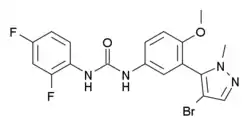 | |
| Clinical data | |
|---|---|
| Other names | APD-125 |
| Routes of administration | Oral |
| ATC code |
|
| Identifiers | |
| |
| CAS Number | |
| PubChem CID | |
| ChemSpider | |
| UNII | |
| KEGG | |
| CompTox Dashboard (EPA) | |
| Chemical and physical data | |
| Formula | C18H15BrF2N4O2 |
| Molar mass | 437.245 g·mol−1 |
| 3D model (JSmol) | |
| |
| |
| | |
Nelotanserin (former developmental code name APD-125) is a drug developed by Arena Pharmaceuticals which acts as an inverse agonist on the serotonin receptor subtype 5-HT2A and was under development for the treatment of insomnia.[1] It was shown to be effective and well tolerated in clinical trials,[2][3] but development was halted in December 2008 because the substance did not meet the trial's effectiveness endpoints.[4] Research continues on newer analogues which may potentially be more successful.[5]
Later, nelotanserin was repurposed for the treatment of Lewy body dementia (LBD) by Axovant Sciences (now Sio Gene Therapies).[6] In late 2018, the company announced that while nelotanserin was generally well-tolerated by LBD patients in a small Phase 2 clinical trial for the treatment of REM sleep behavior disorder (RBD) and there were positive indications on some secondary trial outcomes such as sleep diaries and some polysomnogram sleep parameters, the drug failed to meet its primary endpoint of reducing the frequency of RBD episodes and would be discontinued.[7]
References
- ↑ Teegarden BR, Li H, Jayakumar H, Strah-Pleynet S, Dosa PI, Selaya SD, et al. (March 2010). "Discovery of 1-[3-(4-bromo-2-methyl-2h-pyrazol-3-yl)-4-methoxyphenyl]-3-(2,4-difluorophenyl)urea (nelotanserin) and related 5-hydroxytryptamine2A inverse agonists for the treatment of insomnia". Journal of Medicinal Chemistry. 53 (5): 1923–36. doi:10.1021/jm9007328. PMID 20143782.
- ↑ Rosenberg R, Seiden DJ, Hull SG, Erman M, Schwartz H, Anderson C, et al. (December 2008). "APD125, a selective serotonin 5-HT(2A) receptor inverse agonist, significantly improves sleep maintenance in primary insomnia". Sleep. 31 (12): 1663–71. doi:10.1093/sleep/31.12.1663. PMC 2603489. PMID 19090322.
- ↑ Al-Shamma HA, Anderson C, Chuang E, Luthringer R, Grottick AJ, Hauser E, et al. (January 2010). "Nelotanserin, a novel selective human 5-hydroxytryptamine2A inverse agonist for the treatment of insomnia". The Journal of Pharmacology and Experimental Therapeutics. 332 (1): 281–90. doi:10.1124/jpet.109.160994. PMID 19841476. S2CID 2759858.
- ↑ "APD125 for Insomnia". Arena Pharmaceuticals, Inc. Archived from the original on 2009-08-26.
- ↑ Xiong Y, Ullman B, Choi JS, Cherrier M, Strah-Pleynet S, Decaire M, et al. (August 2010). "Synthesis and in vivo evaluation of phenethylpiperazine amides: selective 5-hydroxytryptamine(2A) receptor antagonists for the treatment of insomnia". Journal of Medicinal Chemistry. 53 (15): 5696–706. doi:10.1021/jm100479q. PMID 20684606.
- ↑ "Nelotanserin - Axovant Gene Therapies". Adis International Ltd. Springer Science+Business Media.
- ↑ "Axovant Reports Results of Exploratory Phase 2 Clinical Study of Nelotanserin in Lewy Body Dementia Patients Experiencing REM Sleep Behavior Disorder". Sio Gene Therapies. December 10, 2018. Retrieved 7 May 2023.